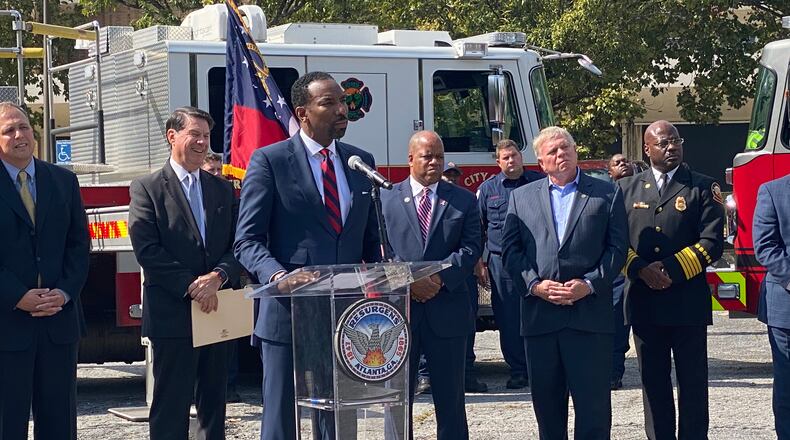As the leaders of the 15 cities that lie wholly or in part in Fulton County, we are uniting in an important effort to protect vital services that our governments provide to our residents. We need our constituents to know what is at stake, and why we are urging the Fulton County government to come to the negotiating table in a serious way in advance of a potentially catastrophic deadline at the end of this year.
Today, fewer than 900 of the total 1.1 million residents of Fulton County live in an unincorporated part of Fulton County. The 15 city governments that we lead provide services that are central to our quality of life and the safety of our communities: parks and recreation, fire and ambulance services and police departments.
Much of these services are funded directly by what’s known as the Local Option Sales Tax, or LOST, which collects 1 percent of all purchases in the county, offsetting property taxes. In a county like Fulton, where 40 percent of dollars spent come from people who live outside the county, this greatly benefits homeowners and businesses.
Today, 95 percent of Fulton’s LOST revenue – which in the most recent year amounted to $300 million – goes to the cities, and less than 5 percent goes to the Fulton County government. This makes sense given that LOST dollars are designed to reflect population distribution and most of the services provided by the county – like courts and the jail — aren’t eligible to be paid for with LOST revenues under state law. These revenues comprise about 20 to 40 percent of Fulton cities’ budgets. In some cases, that might cover the entire cost of the police department.
But there’s a hitch. Every decade, following the census, the county and cities must reach an agreement on how to distribute the money to account for changes in population. If no deal is reached by December 30, the sales tax expires. For our 15 cities, that would deal a devastating blow that could only be addressed through drastic cuts in vital services or steep tax hikes on our residents.
Fulton County is using the threat of letting the tax expire to seek a dramatically higher percentage of this revenue. To date, cities have publicly and transparently shown why they need the money. County leaders only recently began talking in broad terms about rising costs of healthcare services and public safety. The services assigned to the county are largely covered by property taxes. This raises the question: If the county needs money so badly that it’s willing to cripple cities, why did it recently cut the millage rate?
In negotiations, county leaders have warned city officials they need “to prepare for life after LOST.” Such a dramatic action would significantly hurt every property taxpayer — and ultimately every resident — in the county. If the county is seriously willing to let this vital revenue stream disappear, it’s madness to argue it can’t survive on its current share.
And what we’re offering the county is far better than the status quo. Our cities have negotiated in good faith. Our offer on the table provides a fair compromise, increasing the county’s share of the distribution by 43 percent. That’s nearly $300 million over 10 years, $90 million more than under the existing distribution. Fulton commissioners rejected that offer – a proposal we feel certain would cover the rising costs they mentioned.
Fulton County has failed to explain how county residents would be better off if money now used by cities for police, fire, ambulances, parks and roads went to the county instead — which has a history of mismanagement and lack of vision for handling public safety matters, like the severe crowding of its own jail.
It’s not often that the 15 cities of Fulton County speak with one voice, but the actions of the county have brought us together like never before. We’re united in a fight for survival and in our shared belief that cities are the appropriate and most efficient vehicle to provide the services our residents, businesses and visitors depend on.
We ask the people of Fulton County to join us, contact their commissioners, and save our cities. For more information, please visit www.savefultoncities.com.
Atlanta Mayor Andre Dickens, Alpharetta Mayor Jim Gilvin, Chattahoochee Hills Mayor Tom Reed, College Park Mayor Bianca Motley Broom, East Point Mayor Deana Holiday Ingraham, Fairburn Mayor Mario Avery, Hapeville Mayor Alan Hallman, Johns Creek Mayor John Bradberry, Milton Mayor Peyton Jamison, Mountain Park Mayor Jim Still, Palmetto Mayor J. Clark Boddie, Roswell Mayor Kurt Wilson, Sandy Springs Mayor Rusty Paul, South Fulton Mayor Khalid Kamau and Union City Mayor Vince Williams.
About the Author
Keep Reading
The Latest
Featured


